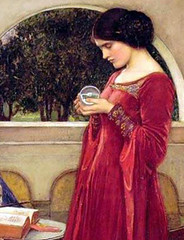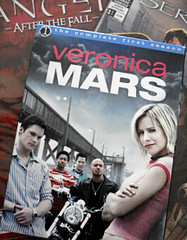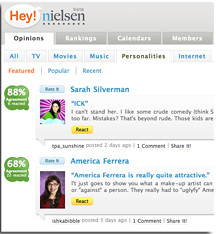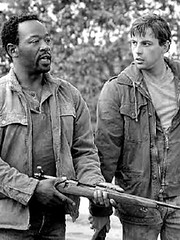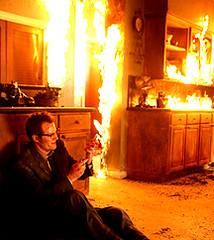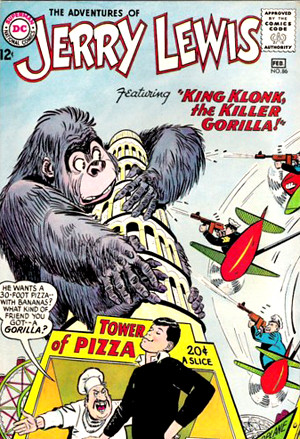The newest trend in communication seems to be the art of prediction.
A quick search on Google reveals some 15.4 million results that contain the word “predicts,” with more than 15,800 appearing in media stories — 400 in the last 24 hours alone. Prediction racks up another 11,000 hits, many trumped up with words like eye-popping, chilling, and current (which gives a nod to the idea that predications change, frequently).
Yep. The hypothetical hyperbole, which we often advise clients to avoid, is king of the hill. It’s become easier than ever to find someone with a crystal ball.
• The Alliance Trust predicts that household expenditures in Britain over the next 12 months will continue to decline as the credit crunch continues to squeeze on people’s finances.
• The Rage predicts that Carrie, in the movie “Sex and the City,” will either fall down a manhole as she rushes to meet the girls for brunch or asphyxiate herself with a Fendi boa.
• Researchers can now predict which button a subject will press 60 percent of the time, slightly better than a random guess.
• The United Nations World Food Programme (WFP) predicts a “silent tsunami” in which high food prices across the globe could force as many as 100 million people into hunger.
The latter is significant at the moment because it’s partly true. Increasing demand from developing countries and poor crop yields are to blame for rising rice prices, up 70 percent this year.
However, the reporting of rice shortage predications is causing restaurants to stock up on and hoard rice and major supermarkets to place limits on the product, which has caused even more demand, making the world rice shortage an almost certain self-fulfilling prophecy.
You can make predications too. It’s easy.
There are several great ways to bend perception into reality, but two have become all my all-time favorites.
The non-committal prediction.
The weather will continue to change for a very long time.
The genius of this prediction is that it is no prediction at all, but rather simply a statement of fact, much like predicting a recession. Sooner or later, it happens. You know, like the CIBC predicting gas to hit $7 per gallon by 2012. Heck, I can do better than that. I’ll guess $10 a gallon, unless we do something about it.
The extended timeline prediction.
Within the next 50 or 100 years, something will happen, anything really.
The genius of this is that you can float a long-term prediction, based upon any number of qualifiers, and have a slightly better chance than a random guess. If it happens, you claim credit as a genius. If it does not happen, no one will remember anyway.
Personally, I think it would be just dandy if journalists started rating predictions on their apparent validity and then giving them a less serious, but more accurate terminology — wild guesses. There are only a paltry 58 of those.

A quick search on Google reveals some 15.4 million results that contain the word “predicts,” with more than 15,800 appearing in media stories — 400 in the last 24 hours alone. Prediction racks up another 11,000 hits, many trumped up with words like eye-popping, chilling, and current (which gives a nod to the idea that predications change, frequently).
Yep. The hypothetical hyperbole, which we often advise clients to avoid, is king of the hill. It’s become easier than ever to find someone with a crystal ball.
• The Alliance Trust predicts that household expenditures in Britain over the next 12 months will continue to decline as the credit crunch continues to squeeze on people’s finances.
• The Rage predicts that Carrie, in the movie “Sex and the City,” will either fall down a manhole as she rushes to meet the girls for brunch or asphyxiate herself with a Fendi boa.
• Researchers can now predict which button a subject will press 60 percent of the time, slightly better than a random guess.
• The United Nations World Food Programme (WFP) predicts a “silent tsunami” in which high food prices across the globe could force as many as 100 million people into hunger.
The latter is significant at the moment because it’s partly true. Increasing demand from developing countries and poor crop yields are to blame for rising rice prices, up 70 percent this year.
However, the reporting of rice shortage predications is causing restaurants to stock up on and hoard rice and major supermarkets to place limits on the product, which has caused even more demand, making the world rice shortage an almost certain self-fulfilling prophecy.
You can make predications too. It’s easy.
There are several great ways to bend perception into reality, but two have become all my all-time favorites.
The non-committal prediction.
The weather will continue to change for a very long time.
The genius of this prediction is that it is no prediction at all, but rather simply a statement of fact, much like predicting a recession. Sooner or later, it happens. You know, like the CIBC predicting gas to hit $7 per gallon by 2012. Heck, I can do better than that. I’ll guess $10 a gallon, unless we do something about it.
The extended timeline prediction.
Within the next 50 or 100 years, something will happen, anything really.
The genius of this is that you can float a long-term prediction, based upon any number of qualifiers, and have a slightly better chance than a random guess. If it happens, you claim credit as a genius. If it does not happen, no one will remember anyway.
Personally, I think it would be just dandy if journalists started rating predictions on their apparent validity and then giving them a less serious, but more accurate terminology — wild guesses. There are only a paltry 58 of those.






